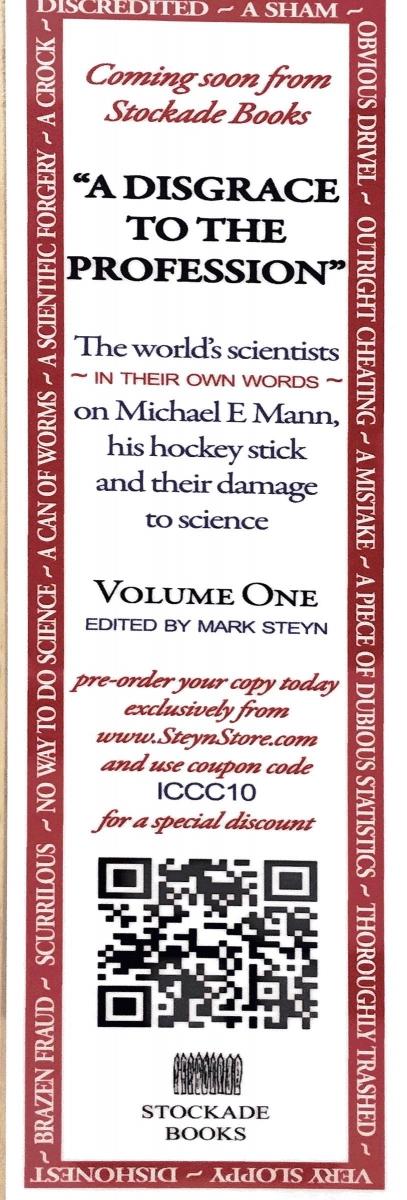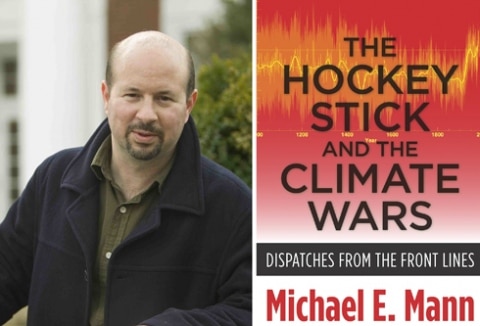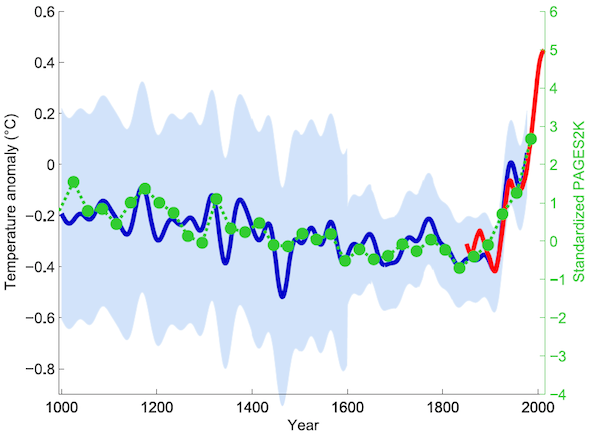DeSmog UK visited Washington DC earlier this month to check out the Heartland Institute’s annual climate denial conference. There, amongst the conference’s hand-outs, we discovered a promotional bookmark advertising a new book attacking Michael Mann’s hockey stick as “a disgrace to the profession”. Greg Laden, biological anthropologist and science communicator, takes a closer look.
There is a new attack by an anti-science and anti-environment talking head on a well-respected climate scientist and his work. Mark Steyn is self-publishing a book of quotes by scientists that allegedly disparage Dr. Michael Mann and the “Hockey Stick.”
If the three examples Steyn provides to advertise his book are representative, Steyn’s book is unlikely to impress.
Like previous attempts to separate a key individual from the herd, Steyn’s latest money making scheme could make him a few bucks (his fans seem gullible) but in the end will destroy anything that happens to be left of his credibility and, possibly, his legal argument that he is not actively and maliciously attempting to defame an individual.
Here’s The Story
Conservative political commentator Mark Steyn has a new book coming out. I haven’t seen it yet, but looking at the publicity material provided by Steyn (the book is self-published) it appears to be a collection of scientist’s comments disparaging the work of Michael Mann and criticizing the famous “Hockey Stick” research.
This is a bit odd because Steyn is currently being sued by Mann for defamation, and this book looks like it could be more defamation. It would appear he has not consulted his lawyers!
The Hockey Stick is a concept, and a graphic, that arose as the result of a paper produced in 1999 by Michael Mann, Raymond Bradley, and Malcolm Hughes. The researchers constructed a proxy northern hemisphere temperature curve, from ice cores and tree rings, which showed temperature variability over the previous 1,000 years.
This curve was matched with direct temperature measurements from the previous century, and ultimately played an important role in demonstrating the effects of human greenhouse gas pollution on the global surface heat balance. The graph showed the dramatic change in surface temperature after industrialization, indicates a steady increase in temperature, and showed how dramatic this change is in relation to previous time periods.
This and other related research, by the same group and others, also showed that previous known historical climate swings such as the so-called “Medieval Warm Period” and “Little Ice Age” were minor compared to recent warming (and also relatively regional, not global).
An example of the Hockey Stick Graph.
As with all important scientific work, there was some controversy but the work was good and over subsequent years it was verified by other research.
PAGES 2K
Indeed, during the several years that have passed since the publication of that study, the global surface temperature has continued to rise, as expected. A post at Climate Progress, written in 2013 by Stefan Rahmstorf, “Most Comprehensive Paleoclimate Reconstruction Confirms Hockey Stick,”, summarizes the confirmation of the “Hockey Stick” in a landmark study known as the PAGES 2K project. Of the confirmation of the Hockey Stick results by PAGES 2K, Rahmstorf writes (the graph he refers to is the one I placed above):
The first comparable hockey stick curve was published in 1998 and 1999 by Mann et al. – at that time based on data only from the northern hemisphere. …
For the scientific community, the confirmation of the old hockey stick is no surprise (except perhaps for the closeness of the match); many other climate reconstructions with a similar time evolution have already appeared since. Mann et al. at the time cautiously assumed a wide margin of uncertainty (light blue) because of their limited data base and a possible underestimation of the variance by their method; later reconstructions run largely within this margin. The work of Mann and colleagues has gained the highest recognition. For example, Bradley was honoured in 2007 with the Oeschger Medal of the European Geosciences Union and Mann likewise in 2012, and both were (as well as Hughes) elected as fellows of the American Geophysical Union. Politically motivated attacks on their work were immense, however – both Bradley and Mann have published books about that experience.
The PAGES 2K work was published in Nature Geoscience as “Continental-scale temperature variability during the past two millennia” authored by the “PAGES 2K Consortium,” a long list of authors ranging across the entire alphabet from A (Moinuddin Ahmed) to Z (Eduardo Zorita).
In essence, these authors found that Michael Mann and his colleagues were right, and the Hockey Stick configuration of global temperature change is correct.
A Disgrace

Steyn provides three quotes that he implies are representative of the statements of “World’s Scientists” criticizing Mann and the Hockey Stick research. They are:
“Do I expect you to publicly denounce the hockey stick as obvious drivel? Well, yes.”
-Jonathan Jones, Professor of Atomic and Laser Physics, University of Oxford
“Michael Mann, Phil Jones and Stefan Rahmstorf should be barred …because the scientific assessments in which they may take part are not credible anymore.”
-Eduardo Zorita, Senior Scientist at Germany’s Institute for Coastal Research
“Did Mann et al get it wrong? Yes, Mann et al got it wrong.”
-Simon Tett, Professor of Climate Science, University of Edinburgh
Now, if I was writing a book that mainly included quotes by experts on something, then picked out three quotes from the entire book to be representative, there are two things I would do.
First, I would make sure the quotes were from credible experts. Second, I would make sure that the quotes are key indisputable examples of what those experts think.
So, I asked myself, does it make sense that Jonathan Jones, Eduardo Zorita, and Simon Tett think Michael Mann got it all wrong, and the Hockey Stick concept is bunk?
I contacted all three of these individuals to see what they thought about this. Let’s start with Simon Tett.
Frankly, I was very surprised to see his quote used by Steyn, because as far as I know, Dr. Tett is a mainstream climate scientist who has made important contributions to understanding variability in the climate record.
Indeed, he has contributed to the Hockey Stick reconstruction by advancing research on the role of aerosols. Tett and Michael Mann have published together on this issue. It made no sense that Tett would be bashing Mann and his work, because some of that is his own work.
I wondered if the quote is taken out of context. Would Mark Steyn take a scholar’s quote out of context, totally changing the meaning, in order to associate that scholar with discredited ideas, or maybe turn one scholar against another?
Of course he would. That is his modus operendi. Maybe he likes getting sued?
Simon Tett
Anyway, when I asked Simon Tett about this, he told me that he does not recall the quote, though perhaps it was from a private email (like this) and has all the context removed. Note that the quote is supposed to have come from 2001, so Tett assumes it would have been, had he actually said it, a criticism of the hockey stick paper.
He told me, “I think my criticism was that it was likely missing some variances. My view then and still is that recent warming is very likely outside the range of natural variability.”
I have not seen Tett’s quote in its original exact context, but I think it is part of a larger bit of text that makes up part of the so-called Climategate 2.0 emails. If so, Tett said:
I think there are issues in Mann et al’s approach −− recall the Esper et al paper which produced a reconstruction with lots more low frequency variability than others. From the comment on the paper by Keith Briffa and Tim Osborn (attached) you can see that Mann’s reconstruction had the least variability of any of the reconstructions. Did Mann et al get it wrong? Yes Mann et al got it wrong. How wrong is still under debate and the ECHO−G/HadCM3 results may be over-exaggerating the variance loss for some model-specific reasons.
This provides more context to Tett’s quote, indicating that this is an argument over variability in Mann et al’s reconstruction of Northern Hemisphere temperatures over the last thousand years.
But there is even more to it than that.
Climate Variability
There was vigorous argument over which models should ultimately be used in the IPCC report that included the Hockey Stick, including one (or two) by Tett that show a similar pattern to Mann et al’s original findings.
In asking around about what was happening in those days I learned a lot more than needed for this humble blog post. Suffice it to say, there was arguing about important details, but not about the basic reality of climate change and recent warming.
All of the discussion had to do with how much variation there was in the older record, and most of that uncertainty has been addressed over the subsequent decade.
Tett’s contribution to climate science has been to address that variability. He has recently co-authored articles with Mike Mann that confirm the Hockey Stick pattern of temperature changes and seek to understand that pattern in terms of natural and human drives of climate. Clearly, he is one of the nearly 100 percent of scientists who view global warming as real and caused by human greenhouse gas pollution.
So. That’s settled. Steyn got it wrong.
Eduardo Zorita
Then I looked at Eduardo Zorita.
He is a paleoclimatologist, so he’s in the game and may have expertise that matters. He has contributed to one IPCC report. He is famous for having suggested that climate scientists adjust their findings under political pressure. From Wikipedia:
Zorita was quoted in the Wall Street Journal as saying that the “scientific debate [on climate change] has been in many instances hijacked to advance other agendas”, and that climate science students are “often tempted to tweak their data so as to fit the ‘politically correct picture’.” Zorita continued, “some, or many issues, about climate change are still not well known. Policy makers should be aware of the attempts to hide these uncertainties ….”
That was in 2009.
So, Zorita is a real climate scientist who has concerns about the way some of the research is conducted. That’s good. Scientists should always be concerned about how the research is conducted, and it is healthy to have such conversations.
But is Zorita a Hockey Stick denier like Mark Steyn implies he is? No.
I gave you a clue to this earlier in the post when I mentioned the PAGES 2K study. Did you notice that Zorita is an author of that major paper, known, among other things, for confirming the Hockey Stick?
Personally I can’t think of a worse choice to list as a person criticizing the hockey stick than an author of the largest effort by scientists that confirmed the hockey stick. Maybe Steyn didn’t know. Maybe he should know stuff before he writes a book about it.
Perception of Objectivity
Zorita did get back to me about Steyn’s use of his quote. He told me that the quote is essentially accurate, and that he has put it on his personal web page several years ago. He was concerned about the perception of objectivity in the IPCC process, so perhaps these researchers should not be part of the process given the controversy at the time caused by the famous Climategate hacked emails.
However, he was careful to note that his statement was “not related to the quality of their scientific work. Actually, my statement was a suggestion to isolate the IPCC process from the credibility crisis linked to Climategate.”
So this is about perception, not about the quality of the science or the validity of the Hockey Stick.
He went on to say, “I feel that those political attacks, especially those against Michael Mann in the US, have no justification.”
Zorita told me that he felt the Hockey Stick was something of a public relations mistake.
“The irony is that the hockey-stick is not a proof and not a disproof of anthropogenic climate change. As Stefan Rahmstorf correctly wrote, if the hockey-stick had not existed the case for [anthropogenic global warming] AGW would not be stronger or weaker. But the hockey-stick had become its symbol and the subject of political manoeuvring.”
Interesting idea. Zorita also indicated that he is in the camp of seeing much more variability in the older surface temperature record than the original Mann Et Al research indicated, adding “this has had no relevance for the case of AGW.”
So, just as with the case of Tett, Zorita is a bad choice for Steyn to use in criticizing the scientists or the science, unless his book is going to support the current science of global warming, but with a detailed look at pre-industrial climate variation. I doubt that is the case.
Jonathan Jones
Jonathan Jones, at Oxford, the third quoted scientist, is a physicist in an area of physics that has absolutely nothing to do with climate change. I think he is a tutor there, but I’m not sure. He published a few things many years ago then seems to have trailed off in academic activity, but nothing on climate science.
Back in the day, he went after the “Hockey Stick” and actually did one of those “Freedom of Information” requests to obtain some data he thought was being kept from him, in order to strike a blow for freedom. (That data was already being shared among various collaborators, but apparently not among random people who demanded it … this is a huge data base and not something you pop in an email and send off to someone.)
He got the data, but never did anything with it as far as I can tell. The rapidly growing consensus on human caused climate change did not fall to some insightful analysis by Jonathan Jones.
Jones responded to my question by simply sending the link to his original quote. The context turns out to be interesting.
The original quote by Jones was a lengthy screed critical of the climate science and the scientists in which he explicitly implores Richard Betts to denounce the hockey stick. (Betts is a climate scientist at the UK’s Met Office, and a lead author for the IPCC 4th assessment report and other IPCC documents.)
Jones indicates that the whole global warming thing is pathological science, will eventually go away, and he hopes he can soon get back to his own research in an utterly unrelated field. Which, I think, he may have done.
Maybe Jonathan Jones, as a non-climate scientist who is also a climate science denier, is an appropriate person to quote in Steyn’s book. One in three … not a very good result.
I’m thinking this is not going to be a very big book. Certainly not a very good one. Maybe Steyn is counting on a lot of pre-orders.
This article has been cross posted from Science Blogs.
Subscribe to our newsletter
Stay up to date with DeSmog news and alerts








